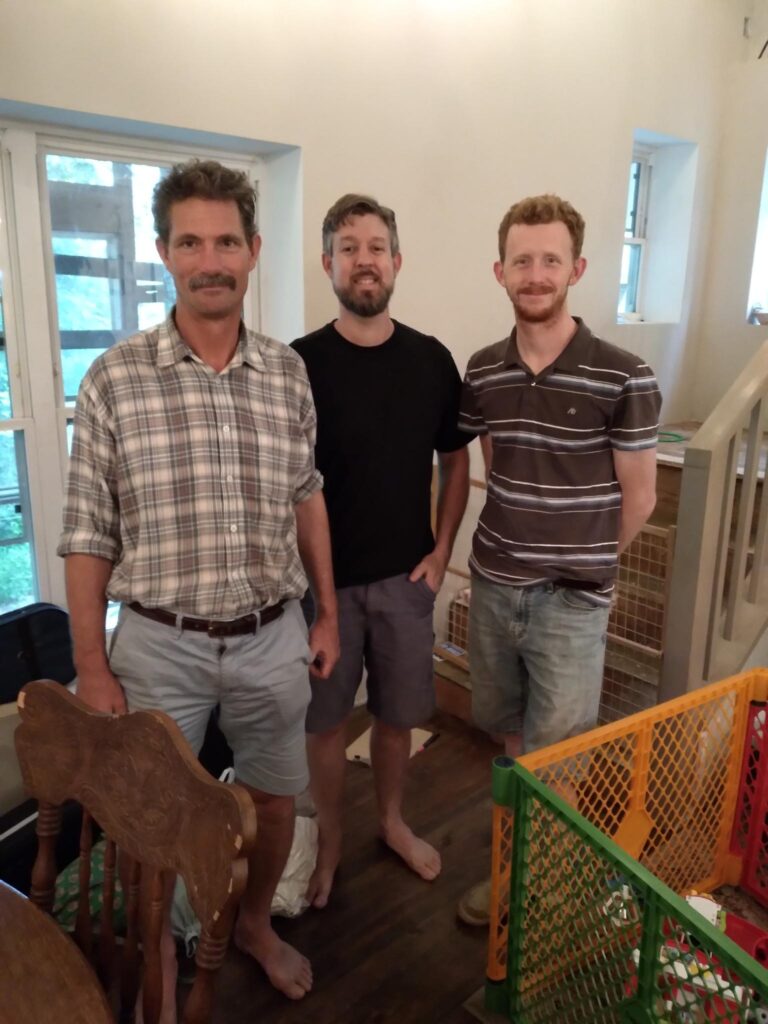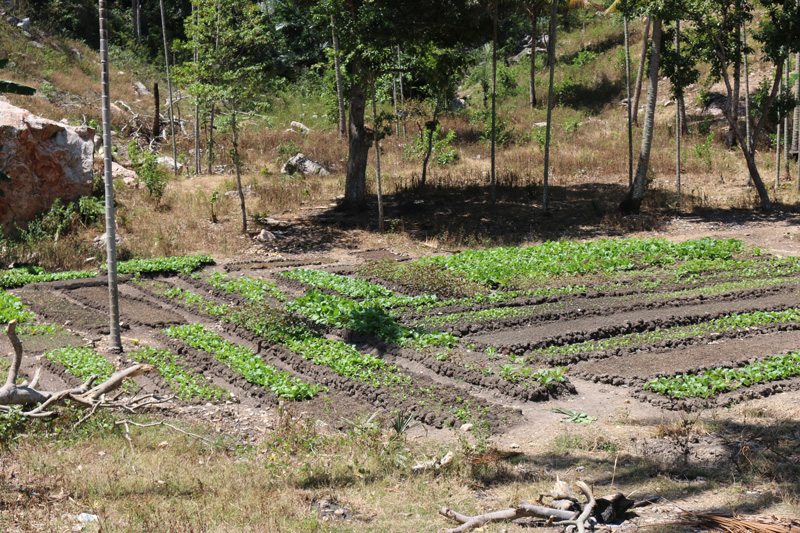I spent a wonderful weekend with Noah Sanders, author of Born Again Dirt and teacher with Foundations for Farming (formerly known as “Farming God’s Way”).
We were also joined by Zimbabwean farmer and human rights activist Ben Freeth, who is a thoughtful and loving Christian brother with a unique heart for the downtrodden.

L to R: Ben Freeth, David The Good and Noah Sanders
Noah’s farm is a meeting place for all sorts of interesting people from around the world. Missionaries and businessmen, new gardeners and old experts, educators and homeschooling moms. We enjoyed our time there and the hospitality, plus the kids enjoyed meeting other homesteading children with an abundance of Nerf guns.
When I was in Indonesia back in 2019 before the world fell apart, I became more familiar with the Foundations For Farming curriculum as it was being used by Kingdom Workers, the Lutheran charity that send me as an advisor. Overall, it is a useful system for restoring degraded land and avoiding the continued destruction of already suffering ecosystems. I enjoyed reading through their training materials in the little apartment we had in Timor.
The ethics and the “Foundations for Profitability” points in the curriculum are solid.
“Profitability is essential for sustained production and development. The only alternative to profitability for survival in the short term is begging or theft, both of which cause poverty in the long term.
Profitability is possible if you faithfully apply these management principles of doing everything:
On Time. Plan ahead. Prepare well. Start early. Never be late!
At a High Standard. Do every operation and detail as well as you can with no shortcuts. Be honest and honorable in all you do.
Without Wasting. Don’t waste time, soil, water, sunlight, seed, nutrients, labour, energy, opportunity etc.
With Joy. If you do these first three things faithfully without self pity, complaining, blaming others, making excuses, but with thankfulness, there will be no need for fear and hopelessness and you will have hope and joy which gives you strength.”
Good points, especially when applied in the third world where poor standards and terrible timing are commonplace. We all need these things, too. Especially joy and honesty.
The Foundations for Farming System of Growing
As for the actual system of farming itself, the points are as follows:
Foundations for a Successful Crop
In order to produce a good crop these principles should be applied:
-Maintain a mulch cover. Don’t burn!
-Maintain the soil structure & preserve the natural fauna. Don’t plough!
-Plant according to precise spacings and specifications in order to achieve optimal plant populations that give your plants the best chance to thrive.
-Give nutrition to your plants in whichever form you are able i.e. manure, compost, etc.
-Weed regularly and thoroughly, catching the weeds while they are small in order to save time and energy and cause the whole system to become far more manageable.
My thoughts on the Foundations for Farming Growing System
Though I appreciate the work FFF does, I am not a complete advocate of the system. Here are my thoughts on the five points.
Mulching and Burning
On maintaining a mulch cover, I have a mixed opinion. Sometimes mulching can lead to an incredible buildup of pests, particularly in wet tropical situations. You may build lovely soil, but you may also have all your tender crops consumed by slugs. As for not burning, this is a good general approach, particularly in areas where slash and burn is rampant. However, I believe in controlled burning in order to create biochar and ashes for feeding the soil. It’s too broad to say “don’t burn.” I don’t like to lay down commandments when it comes to farming.
Without burning, you don’t get terra preta.
Bare soil and burning can both have their place in a sustainable system. Burning a field to rejuvenate the area and drive away poisonous snakes is helpful as well.
Plowing
On the second point, I also believe there is a place for plowing – or at least some form of tillage. I primarily dig only once and then build up the soil from there, but that initial dig is very helpful. Plowing can destroy soil structure long term, so I understand the prohibition, but again: it’s too broad. You can have good luck building soil by tilling under cover crops. The method of tillage makes a difference, too. Remember The Plowman’s Folly.
Spacing
On point three, no arguments. Good spacing is a good idea. Your spacing should vary based on climate and soil fertility, however.
Fertilizing
Point four is okay for survival gardening, but not for the best nutrition. There is a strain of no-till dogma these days that promotes the idea that soil mineralization and composition doesn’t really matter, provided you have plenty of microlife in the soil to make nutrients available. I do not believe this to be the truth. I also don’t believe in the other extreme, where you simply look at the dead mineral composition of the dirt and add whatever is lacking without considering the life in the soil. Instead, I embrace the idea that you need both lots of life in the soil as well as plenty of raw materials for that soil life to make available. If you need to garden to survive, sure – go ahead and feed with whatever you have. But if you want optimal nutrition in your food, you should seek out fertilizers that also provide micronutrients that plants can use and then make available to us. There are studies showing a decrease in the minerals in our food supply due to the depletion of soils. I don’t think these minerals can be replaced in poor soil with simply composting on site or throwing on some local manure.
Weeding
On the final point: yes, keep the weeds out. They compete for resources and will lower your harvests.
I’m not opposed to the Foundations for Farming System as a good jumping off point; however, I do believe there are exceptions to some of the rules. The principles were useful when I was in Indonesia, as they were meticulously removing all the weeds and grass down to bare dirt everywhere and burning all the organic matter in between gardens. It was shocking to see houses surrounded by nothing but bare dirt because that was what they believed was best. Learning to compost and stop burning everything is important. And mulching around their fruit trees is a great idea. But there is a time and place for everything. Foundations for Farming is a decent foundation in some situations, but not in all.
Whether you’re reading about Back to Eden Gardening, Square Foot Gardening, Single Row Gardening, Deep Mulch Gardening, Biointensive Gardening or even Grocery Row Gardening, you need to take what works for you in your situation and discard what doesn’t.
Learn to observe, test, learn and be diligent and you’ll succeed with your very own system of gardening. I don’t think God has any one favorite form of farming (except for maybe food forests).
All that said, I greatly appreciate the good work being done by Ben and Noah and many others. The primary importance in this is saving souls and helping people grow their own food. It’s light years ahead of poison-based commercial farming methods. I certainly agree much more than I disagree.
So – what do you think about the Foundations for Farming methods? Perhaps these “rules” are needed in places where everything is upside-down and good education is lacking. Maybe I’m way off-base. I have been in the past, like when I used to not like okra.
Please share your thoughts below.


8 comments
Wow, it looks like a great time, and this article reads like another book! Trying to absorb all the knowledge, thank you. Well done.
Thank you. I don’t have the end-all system, but I can tell you what’s worked in our gardens.
Yeah, the excessive burning is tough to discourage. It remains prevalent, and noting the benefits of ash and char can confuse the issue a bit.
Nuance is perhaps difficult to work into an international education program, so I can’t fault them for ending up on the side of not burning.
I agree.
Have been watching your YouTube videos for several years, not knowing we were neighbors. We live next to Jumbolair in Anthony near your former north central Florida Food Forest. Love Your family, Your faith and Your wonderful sense of Humor as well as your musical talent. It is great to see someone with the same moral values and interests as me and my family. Keep up the great work and God Bless.
No way, Ridley! I love that area. It’s beautiful. We miss having Sparr Hardware down the road.
I agree their tenets are a good starting point, Mr Good. Once people think differently about “how it’s done,” nuance can be added. That’s not just for cross-cultural settings; even for next-door neighbors! (Well, THAT can be cross-cultural, too…)
We adhere to the strategy of Use What Works, but within the over-arching principles of build-the-soil, regenerative, organic, permaculture, STUN, “Ruth Stout”…
What works in our orchard does not work in our hoop house. What works in our food forest doesn’t work in the “bean field.” I have been known to use Miracle Grow, too. But not on food crops. Yet.
This autumn we’re going to transplant some perennials from the five year old orchard and try out some Grocery Row ideas. Maybe beans up an apple tree, kale between the pear trees, lettuces around the asparagus. Not sure! But it’s going to be fun. Thank you, brother!
Yeah, I was cringing a little as I was reading their tenets. The more I learn about squishy topics like gardening, nutrition, and parenting, the more I feel like you just can’t lay down universal edicts and expect it to work for everybody. Like most important things in life, these principles are applied at the individual level, and every individual (or family or household) is different, and needs to tailor their approach to fit their situation and needs and priorities.
Granted, I can see the benefit of promoting some advice about “best practices,” even if they’re not always best but might be better than what most people receiving the message are currently doing. But then I also wonder about the people who will distrust the whole message because they can see that some of the principles are flawed.
I’m inclined to think that if you’re trying to influence a lot of people and convince them to do things better, maybe it’s best to keep your advice as conservative as possible. Stick to the most basic, universal principles, and focus on those, and then feel free to offer suggestions about the more nuanced stuff. So instead of “Never plough!” You could say, “Try ploughing less often; here are some great ways to break up the soil without ploughing…” and then you’re offering options, instead of issueing commands and judgements.
Not that they’re asking me. But as an irredeemable contrarian I know nothing makes me want to be non-compliant like being told I have to do a certain thing in a certain way.
Comments are closed.